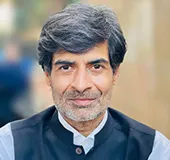
2024 is a decisive year for democracy and the liberal order. 1.8 billion citizens in India and the United States, who together constitute nearly 1/4
th of the world’s population, are going to elect their governments in the very same year. This will be the first such instance in a world increasingly mediated and intermediated by platforms, who will be crucial actors shaping individual choices, voter preferences, and indeed, outcomes at these hustings. It is therefore, important to recognise these platforms as actors and not just benign intermediaries.
Prime Minister Modi’s government, especially in its second term, has approached digital regulation with the objective of establishing openness, trust and safety, and accountability. In June this year, Union Minister of State for Electronics & Technology, Rajeev Chandrasekhar, invited public inputs on the draft amendments to the IT Rules 2021 with an ‘open, safe and trusted, accountable internet’ as the central area of focus.
Runaway platforms and cowboy capitalism are the big dangers to the sanctity of our elections and to the citizens’ acceptance of political outcomes.
This Indian aspiration for Accountable Tech must be an imperative for all liberal and open societies if we are to enrich the public sphere, promote innovation and inclusive participation, and indeed, defend democracy itself. If we fail to act now and act in unison, we could end up perverting the outcomes in 2024. Runaway platforms and cowboy capitalism are the big dangers to the sanctity of our elections and to the citizens’ acceptance of political outcomes. India has clearly seen the need for it and is striving to make large tech companies accountable to the geographies they serve. The latest comer who seems to have understood the importance of this is the United States of America.
On 8 September 2022, the White House convened a Listening Session on Tech Platform Accountability
‘with experts and practitioners on the harms that tech platforms cause and the need for greater accountability’. The session
‘identified concerns in six key areas: competition; privacy; youth mental health; misinformation and disinformation; illegal and abusive conduct, including sexual exploitation; and algorithmic discrimination and lack of transparency.’ Hopefully, this session will lead to a more contemporary regulatory and accountability framework that aligns with what is underway in India.
From private censorship and unaccountable conversations hosted by intermediaries to propagation of polarised views, all of them constitute a clear and present danger to democracies, and certainly to India and the US, who are among the most plural, open, and loud digital societies. Digital India is indeed going to be ground zero of how heterogenous, diverse, and open societies co-exist online and in the real world. The efforts of the Indian government to put together sensible regulation may actually benefit many more geographies and communities. If India can create a model that works in the complex human terrain of India, variants of it would be applicable across the world.
The efforts of the Indian government to put together sensible regulation may actually benefit many more geographies and communities.
It must also be understood that there is no single approach to manage platforms, even though there could be a wider and shared urge to promote openness, trust and safety, and accountability. The regulations that flow from this ambition are necessarily going to be contextual and country specific.
Hence, it is important that India, the US, and other large digital hubs coordinate and collaborate with each other to defend these universal principles even as they institute their own and region-specific regulations. For instance, policy architecture in the US will focus on managing platforms and technology companies operating under American law and consistent with their constitutional ethos. India, on the other hand, has the onerous task of ensuring that these same corporations adhere to Indian law and India’s own constitutional ethic.
India and the US lead the free world in terms of global social media users. As of January 2022,
India had 329.65 million Facebook,
23.6 million Twitter, and
487.5 million WhatsApp (June 2021) users, while the US had
179.65 million Facebook, 76.9 million Twitter, and
79.6 million WhatsApp (June 2021) users. The online world is no longer a negligible part of society. Most people online see the medium as an agency additive and are keen to use it to further their views and influence others’ thinking. Of these, many are also influencers in their own localities. What transpires online now has a population scale impact. The mainstream media reads from it, social media trends define the next day’s headline and the debates on primetime television.
Policy architecture in the US will focus on managing platforms and technology companies operating under American law and consistent with their constitutional ethos.
Thus, the idea that one can be casual in managing content on these platforms is no longer feasible and will have deleterious consequences as recent developments have shown. Intermediary liability, that sought to insulate platforms from societal expectations, needs to be transformed to a notion of intermediary responsibility. It must now become a positive and a proactive accountability agenda where the platforms become a part of responsible governance and responsible citizenship.
Predictable regulation is also good for business and policy arbitrage harms corporate planning; so, platforms too have a stake in making their board rooms and leadership accountable. They must make their codes and designs contextual and stop hiding behind algorithmic decision-making that threatens to harm everyone, including their own future growth prospects. And this must be the ambition as we head into 2024–the year when technology could decide the fate of the free world.
The views expressed above belong to the author(s). ORF research and analyses now available on Telegram! Click here to access our curated content — blogs, longforms and interviews.



 2024 is a decisive year for democracy and the liberal order. 1.8 billion citizens in India and the United States, who together constitute nearly 1/4th of the world’s population, are going to elect their governments in the very same year. This will be the first such instance in a world increasingly mediated and intermediated by platforms, who will be crucial actors shaping individual choices, voter preferences, and indeed, outcomes at these hustings. It is therefore, important to recognise these platforms as actors and not just benign intermediaries.
Prime Minister Modi’s government, especially in its second term, has approached digital regulation with the objective of establishing openness, trust and safety, and accountability. In June this year, Union Minister of State for Electronics & Technology, Rajeev Chandrasekhar, invited public inputs on the draft amendments to the IT Rules 2021 with an ‘open, safe and trusted, accountable internet’ as the central area of focus.
2024 is a decisive year for democracy and the liberal order. 1.8 billion citizens in India and the United States, who together constitute nearly 1/4th of the world’s population, are going to elect their governments in the very same year. This will be the first such instance in a world increasingly mediated and intermediated by platforms, who will be crucial actors shaping individual choices, voter preferences, and indeed, outcomes at these hustings. It is therefore, important to recognise these platforms as actors and not just benign intermediaries.
Prime Minister Modi’s government, especially in its second term, has approached digital regulation with the objective of establishing openness, trust and safety, and accountability. In June this year, Union Minister of State for Electronics & Technology, Rajeev Chandrasekhar, invited public inputs on the draft amendments to the IT Rules 2021 with an ‘open, safe and trusted, accountable internet’ as the central area of focus.
 PREV
PREV


